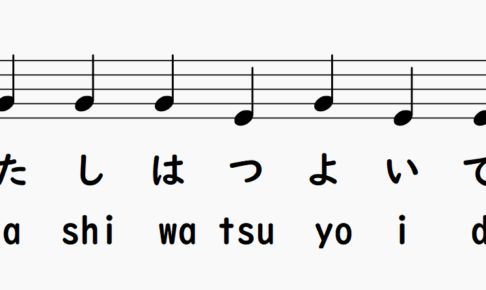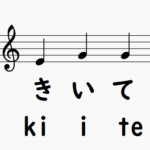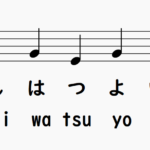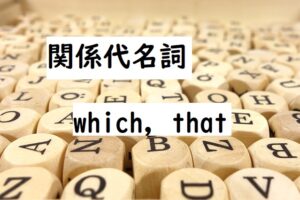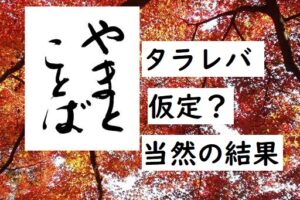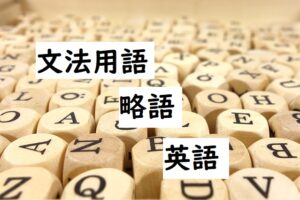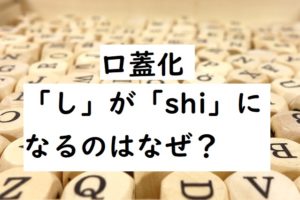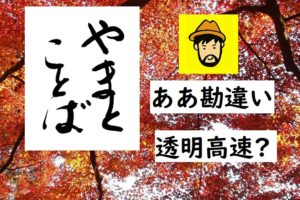目次をご覧になりたい方はクリックしてください→
「Japanese」「beat」「pitch」「accent」
Japanese beat and pitch accent 日本語の拍と高低アクセント (日本語のページ)
Same length of a letter in Japanese language
拍 haku (beat)
constant beat
The most difference between Japanese and English is:
“Every length of a letter (tone) is same”
For example, we Japanese say “私は強いです (わたしはつよいです) I’m strong.” like this.

We say a “mora” as a grammatical term for a beat.
I use a “beat” in this article.
pitch accent
We Japanese usually use only two pitches (heights of tones) as the other characteristics.
I use Mi (E) and Sol (G) as an example, but actually we don’t speak with these heights or intervals or durations as you know.
Don’t play instruments or sing!😄

It’s not totally only two heights of tones.
A tone for emphasis will go up and an end of sentence will go down.
In a interrogative sentence, the end of sentence will go up.
So heights go up and down like this.
All Japanese letter (tone) is one set of “consonant + vowel”
As wa, ta, shi, wa, tsu, yo, i, de, su:
Every letter (tone) is made of a consonant and a vowel, or a vowel.
We have only “ん (n)” consonant in Japanese language.
We pronounce “です (desu)”, “ます (masu)” as “des”, “mas” devoiced.
These are pronouced “desu”, “masu” in the west area in Japan.
So people in the east area in Japan feel little uncomfortable.
These are devoices, not consonants.
There are devoices like “き (ki)” in “聞く (kiku)”, but I don’t explain here because which is very complicated.
I’ll mention it at another article.
English has different lengths and heights of tones

You say consonants at once, and continue vowels as you like
For example, “I’m strong.” is pronounced like above.
Heights and lengths of tones are not real, as you know.
We Japanese are scared and surprised that the English say consonants like “str” at once!
We have no series of consonants.
You extend emphasized vowels, and make them schwa (unclear) or extinguish if not emphasized.
It’s a good example as “I am” changes to “I’m”.
Vowels are not important in English.
stress accent
We use the word stress accent, but pitch also go up to emphasize.
You use more wide and free pitches than Japanese language which has only two pitches.
Vowels not stressed become fuzzy.
Japanese pronunciation
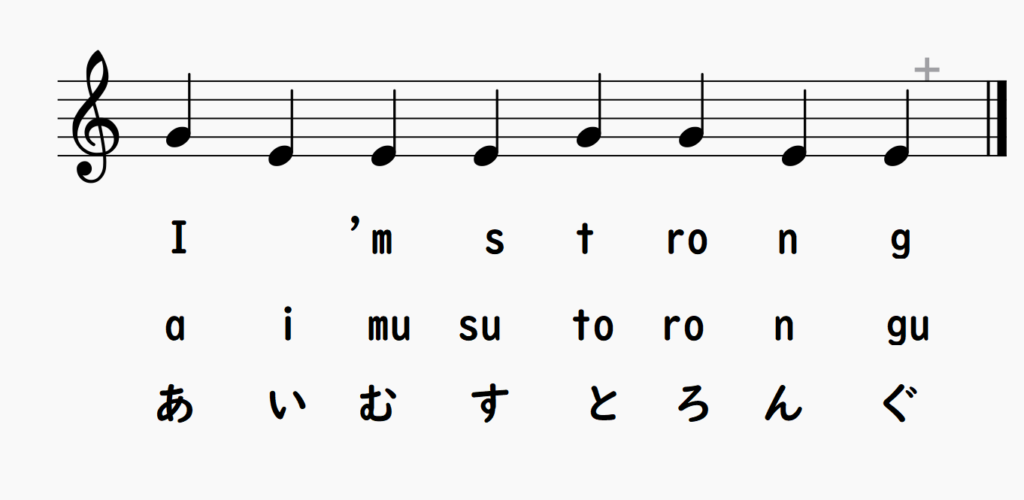
We Japanese pronounce “I’m strong.” like above.
We attach vowels to all consonants, then pronounce them by constant beat and two pitches.
It’s not about which language is superior to the other.
Please grasp they are differences of characteristics between them.
It’s good to exercise to speak English considering the characteristics when you speak English, you know.
It is the most important purpose that languages inform each other even if not completely.
There are many people who had become “English-hater” and have an inferiority complex by English education in Japan.
But Japanese language is the great one around the world.
Please be proud of being native Japanese speaker.
Foreigners who study Japanese as a second foreign language struggle so much.😅
Vowels are only “bridges” in English
abbreviations
building → BLDG
freeway → FRWY
limited → LTD
Seeing these abbreviations, only consonants are important to them.
No matter if vowels don’t exist.
So you don’t see any vowels in abbreviations.
You can get meanings if only you’d read or hear consonants.
But it’s difficult to say words with only consonants.
So you put in vowels between consonants as bridges.
Lengths of vowels are at your choice.
Both of a [ə] and straight [streit] are only one syllable!
We Japanese are scared about series of consonants like “str” which we don’t have in Japanese language.
You say it at once.
“str” is one consonant.
Japanese beat
The lengths of Japanese beat are very important because all of them are same.
To student learning Japanese
constant beat & two pitches
Please always remind that Japanese language has constant beat and two pitches.
Vowels are very important
Vowels are very important in Japanese.
We can make such a sentence.
“uenoaoiieeiiniiku”
「うえのあおいいええいいにいく (上の青い家へ言いに行く) I go to the blue house above to say.」
You need to have a constant beat, two-pitch accent and pronounce vowels very clearly “in tempo”.
If not, we can’t understand what you say.
I’m a professional Japanese teacher.
Please contact me😊
Toshi in italki.
https://www.italki.com/teacher/8455009/japanese




